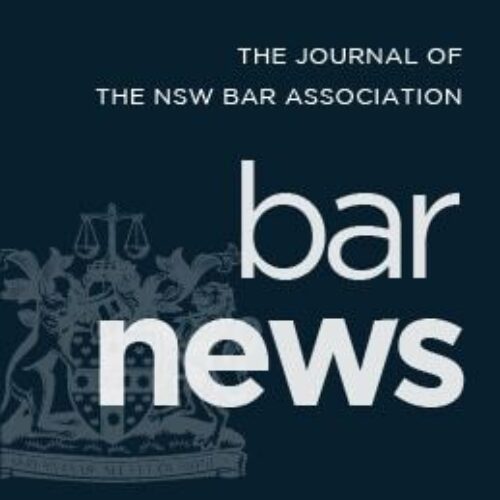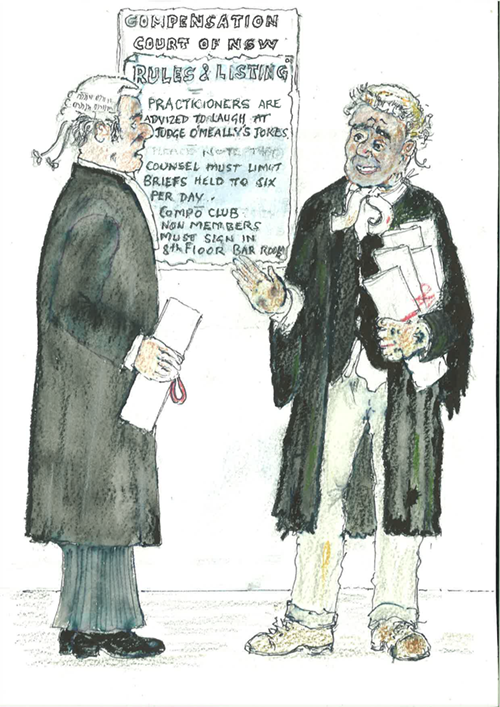- Autumn 2023
- Bullfry and the Duty Judge

There was nothing quite like the smell of forensic ‘napalm’ in the morning – an outing to the Duty Judge in the old days often savoured of an early Tyson fight: one feared to look away from the screen lest one miss an advocate’s ear being bitten off!
To begin, there is no doubt that in Bullfry’s time, in the 1990s, the Equity Duty list was something of a club into which one was only slowly initiated, and into which many never gained entrance at all. Gilchrist Alexander1 records the self-same phenomenon in London in the 1890s, exactly a hundred years before. ‘Common law men used occasionally to adventure into Chancery Courts where they were often eyed suspiciously as gate-crashers.
But when Chancery judges somewhat maliciously used to ask in a most confusing way: “Will you take a St Mary’s harbour order?” or “Do you place your case on the footing of the Fox case?” the bewildered common-law man would often find a Chancery brother tugging at his gown and whispering into his ear the requisite answer.’ (By way of contrast, when Bullfry timidly ventured into the Compensation Court to fight the redemption of a pension he was greeted with the greatest kindness by his venerable opponent.
Bullfry had refused a ‘final’ offer of $60,000 only to have his opponent return to dicker again. ‘But I refused your final offer,’ said a naïve Bullfry. ‘Down here, a `final’ offer is never final,’ said his opponent. He added, in a kindly voice, ‘That is $1,300 for you on Scale C. And don’t forget your conference.’ ‘What conference?’ asked a bewildered Bullfry. ‘I just saw you have another conference,’ said his kindly opponent. What a wonderful system that had been for all concerned in its operation – ‘Would your Honour just hold that matter in the list for half an hour? My opponent is caught before Judge Duck!’).
As he became used to the Equity Division, Bullfry would ‘uplift’ a matter awaiting hearing in a crowded Duty list and approach the Chief Judge who was always eager to hear any dispute and advance Equity jurisprudence. ‘Not you again,’ Mrs Bergin would say with a smile.
In that Division, the basic maxims of Equity would always provide a sure footing for action. Chief among them was – Leges subveniunt vigilantibus non dormientibus – the Law assists those who are awake, not sleeping on their rights. And as a general rule, you can never be worse off being in court; just pull on the goggles and helmet and start the engine!
The clients had come to Bullfry complaining of corporate oppression, and the improper substitution of corporate office bearers and accompanying peculation. ‘We must approach the Duty Judge immediately,’ said Bullfry. But the clients had demurred – there was some issue of resolving the matter via an intermediary and a familial element intruded.
Two weeks later things had changed for the worse and they were off to court (Bullfry dubitante). ‘But does your Honour see the typeof misconduct we are dealing with? In paragraph 38 the director deposes to being held out a window to obtain his signature to the empowering document.’
‘That is just normal business practice in North Sydney, Mr Bullfry. You may short serve a summons but you are out of time for any interlocutory relief,’ said Mr Justice Young.
Contrast the Anton Piller order. Young employees had left the international company and set up their own competing business against the leviathan former employer. They sought Bullfry’s advice. ‘They will need to move promptly. If nothing happens by the end of the week we should be in the clear,’ said Bullfry.
That Friday morning, at 8:30 am: ‘They are here with solicitors from Megafirm and demanding entry to search our premises,’ said the young damsel. ‘What should we do? There is a 'supervising solicitor' here who is recommending that we let them in and saying it is a contempt not to do so!’
‘As I told you in our conference, you are entitled to seek legal advice for a reasonable time on the terms of the order without any fear of contempt. Simply close the door, make them a cup of tea and tell them to wait,’ said Bullfry.
About 10 minutes later, a senior Associate from Megafirm was on the phone to Bullfry:
‘What is going on? We have a search order here that we wish to enforce,’ she said, plaintively. ‘That is no concern of mine,’ said Bullfry. ‘I will be applying to the Duty Judge at 10 o’clock to discharge the order.’
‘On what grounds?’
‘I haven’t seen the order yet,’ said Bullfry. ‘But, no doubt, grounds of complaint will occur to me as I cross Phillip Street and head towards Mr Justice Hodgson.’
‘But I don’t have a barrister!’
‘That is not my problem. His Honour is always courtesy personified,’ said Bullfry.
‘Just come up and tell him your story.’
Coram Hodgson CJ in Eq.
‘I haven’t seen one of these for a couple of months, Mr Bullfry. I will just adjourn briefly and look at it in Chambers.’ Twenty minutes later, his Honour returned with the offending ‘order’ covered with red ink and comments. Bullfry, on instructions, gave a modest undertaking and headed for a latte.
A week later the case returned to Court before another judge who took a serious view of an applicant’s duty of disclosure when seeking an ex parte order and matters took a serious turn for the worse for Megafirm.
‘But Mr Smith, Mr Smith, why was this not disclosed to the Duty Judge when the original order was sought? A failure like this almost entitles the applicant to indemnity costs and the discharge of the order ex debito justitiae.’
With his customary felicity, counsel for Megafirm after some anxious moments persuaded his Honour that the default was not as serious as it first appeared. It was also possible, as necessary, to make an urgent application ore tenus, and without any supporting paper at all upon giving an undertaking that the instructing solicitor would file a summons promptly, upon the order being granted. What a happy, happy contrast with the Federal counterpart.
Many years before, Bullfry had sought an injunction to prevent certain named ‘Federal Agents’ (sic) from searching his client’s premises. Some sort of large-scale sales tax carousel fraud was indicated in the offending warrant. (And, of course, a search warrant differs from an Anton Piller order in a most important particular; the ‘constables’ enforcing it are not obliged to wait while legal advice is obtained and may break down walls, and doors, with such assistance as they require to gain entry!)
In those far off days, one needed first to approach the Associate to the Chief Justice to find out which judge might be available to hear you – there was no Duty List (unlike the Supreme Court).
‘Is the matter urgent?,’ said the nice North American young woman.
‘Well,’ said Bullfry, ‘there are federal police with guns drawn at my client’s flat in Knox Street, going through his DVDs and his underwear.’ Minutes passed but there was no succour. So Bullfry ambled over across the square and knocked on the door of a jurist whose racememory disinclined him to favour arbitrary investigative action – the jurist issued telephone and other orders which stymied the search then and there. It is important always to remember that the Equity Division is not a court of strict pleading at all. Early in his career, young Bullfry had put on a rolled-up plea of estoppels and denials in answer to the lending bank’s mortgage claim. In a busy Commercial Division motions list on a Friday the silk for the bank and his junior sought to have the whole pleading struck out as demurrable. That lovely jurist, Justice Bainton, scrutinised the allegations set out in Part C very carefully and then politely inquired whether particulars had been sought, without calling on young Bullfry at all. He dismissed the motion with the inimitable observation:
‘But this is a summons division, Mr Oslington.’
Bullfry could have kissed him!
Which reminds me, at the Fifteen Bobber upon the appointment of Bainton QC and Morling QC, Hely QC spoke with his usual rasping incisiveness.
‘When they each received their first payments upon appointment, both of them were astounded. Trevor had never received such a small cheque, and Russell had never paid so much tax!’
That is not to say that it was always plain sailing. Sometimes, for example, you could be caught out when resisting an urgent 88K application with a view to exerting commercial pressure on an overextended property developer.
Justice Windeyer: ‘But how often does your client use the right of way?’
‘It doesn’t, your Honour.’
‘No, I didn’t think so. The injunction is dissolved and you may short-serve.’
Or even worse – Justice Windeyer (with unerring prescience): I am going to grant you an injunction to keep the contract for sale on foot, Mr Bullfry, but I don’t think you will hold it as the matter goes higher up!’
There were ten types of case in the Equity Division and Bullfry had lost each of them many times – but what an incomparably pleasant forensic way to earn a living while drinking coffee. There was only one judicial post Bullfry had ever coveted: Equity Division Duty Judge. Perhaps if there was any truth in reincarnation, whatever gods may be would send him back to seek that post in his next life-time. BN

ENDNOTES
1 Gilchrist Alexander, The Temple of the Nineties (1938) p 185.
